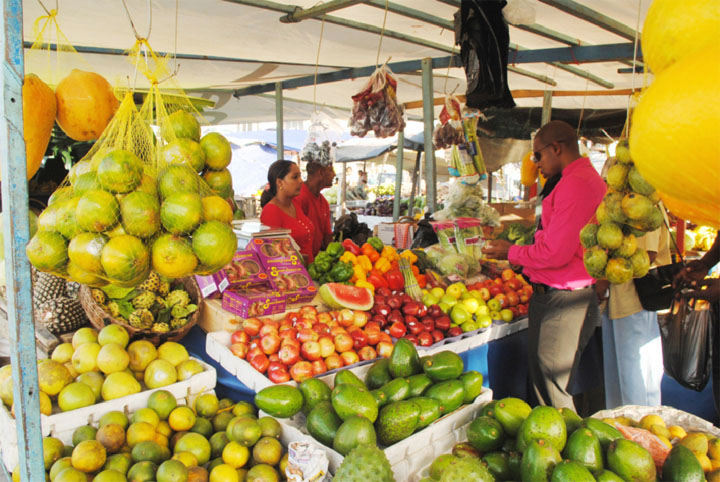Even as several reputable international organizations including the United Nations (UN) and the World Trade Organization (WTO) assert that the ongoing coronavirus ‘plague’ could precipitate a global food crisis, Guyana, up until now, continues to flaunt its reputation as the ‘bread basket’ of the Caribbean by not just continuing to provide more than enough to meet local food needs but also to help meet the needs of sister CARICOM countries as well as more limited markets outside of the region.
Food prices in the city’s municipal markets too, appear to have been largely unaffected by the coronavirus outbreak, though some farm produce, notably ginger, limes and lemons, commonly associated with home remedies for a range of illnesses, recorded price increases.
Up to this week, the evidence in the coastal municipal markets suggests that food shortages are unlikely to become a problem here any time soon. This appeared to be the pattern here even as the Heads of the UN’s Food & Agriculture Organization, the World Health Organization and the World Trade Organization were declaring in a joint statement that “uncertainty about food availability” could spark “a wave of export restrictions, creating a shortage on the global market.
As this supposed threat was being articulated, international news services continued to be clogged with reports of panic buying driven apparently by threatened lockdowns in some countries, a circumstance which the UN was fearing could precipitate a potential worldwide food shortage if the authorities in various countries fail to manage the ongoing coronavirus properly.
While City Hall has now set 7:00 hrs to 14:00 hrs as the opening times for municipal markets – one of the measures designed to respond to the coronavirus outbreak here – there still remains no sign of unusual price increases or panic buying associated with anticipated shortages. One Berbice farmer/vendor with whom this newspaper spoke said that there still remains “a lot of good food waiting to come out from the farms”… and we still have food in the ground.”
It is a reassurance that provides a deserving payback for a country which, apart from being blessed with sprawling expanses of arable land has, over the years, invested heavily in the growth of the sector.
Information provided by the Guyana Marketing Corporation’s Pack House at Sophia meanwhile, suggests that food export levels to the region and to a lesser extent to the USA and Canada between February and April remained brisk with pumpkin, watermelon, pineapple, eddo, lime and coconut being the main exports. In February a total of 91,173 kg of fresh produce was exported through the Sophia Pack House whilst the same facility processed 48,601 kg of food exports in March and 58,096 kg in April. During the same period the Parika processing facility handled 6,185 kg, 2,181 kg and 4,665 kg of fresh produce bound for export markets.
Most of the exported produce was supplied by farmers in Corentyne, East Coast Demerara and Wakenaam, respectively.
Last week, during a telephone conversation with this newspaper, the Chief Executive Officer of the Small Business Bureau said that there was, even at this time, evidence of impressive levels of agricultural production though he acknowledged that the current circumstances gave rise to the need for the creation of preservation and storage facilities for agricultural produce that cannot be consumed at this time but which might be placed on the market later.
Earlier this week the Ministry of Agriculture announced in a media release that its Rural Affairs Secretariat had launched a COVID-19 Relief Kitchen Garden Initiative aimed at providing “a nutritional balance to families and a deterrence from toxic chemical use… in a time when maintaining healthy immune systems is priority.” The release quoted Minister within the Ministry of Agriculture with responsibility for Rural Affairs, Valerie Adams-Yearwood as saying that the Ministry intends to assist persons in this pursuit by providing assistance to “acquire small garden tools, seeds, irrigation and other planting material to get their kitchen gardens going.” The Minister is further quoted as saying that “with many persons out of jobs” the initiative was designed to help such persons “to feed their families” in order to help them maintain healthy immune systems.






